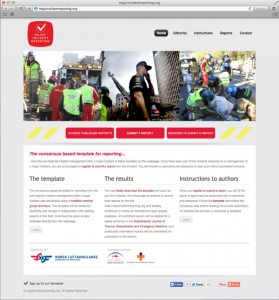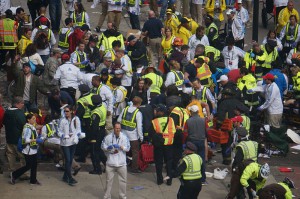It’s now just over ten months since the citizens of Boston – and indeed the world – were shocked witnesses to the bombing of the Boston marathon. In situations like these, we all hope that the Emergency Medical Services will have the knowledge and resources to help those in need.
Incidents like this are known as ‘major incidents,’ which is an Emergency Medical Services (EMS) term for incidents that require the mobilization of extraordinary EMS resources, such as the implementation of special arrangements by one or more of the emergency services, the direct or indirect involvement of large numbers of people, and possibly the mobilization of multiple government agencies.
Learning from previous major incidents is key to ensuring that the emergency services can continue to improve their responses at future ones. However, a lack of standardized data, lack of uniform nomenclature, and most importantly, lack of a centralized location to record details of major incidents, mean that analysis of previous incidents and the development of new recommendations can be challenging.
This is why the Norwegian Air Ambulance Foundation (Norsk Luftambulanse) has sponsored MajorIncidentReporting.Org—a database where EMS personnel can report on major incidents using a consensus-based template for major incident reporting, developed using a modified nominal group technique. This technique is described in an article by Lossius et al., and the template itself is detailed in an article by Fattah et. al., both of which are published in the Scandinavian Journal of Trauma Resuscitation and Emergency Medicine(SJTREM), the official journal of the Norwegian Air Ambulance Foundation.
The new database has already been endorsed by London’s Air Ambulance and the Norwegian Trauma Competency Service.

“It’s important to report from major incidents so others may learn lessons from what succeeded and what was less successful,” said Sabina Fattah, a researcher in the Department of Research and Development, Norwegian Air Ambulance Foundation, and Managing Editor of MajorIncidentReporting.Org.
“Gathering uniform data is necessary so comparative analysis can be performed, enabling planners and emergency responders to identify tendencies and correlations between certain actions and outcomes in different types of incidents.”
Before the database was created, several experts in disaster medicine called for uniform reporting to enable better science within the field. The idea for majorincidentreporting.org was a result of collaboration between the Norwegian Air Ambulance and London HEMS. The work started by conducting a systematic review to identify existing templates for reporting major incident medical management.
“We found 10 different templates that, unfortunately, had been used on a limited scale,” Fattah said. “The next question then was how we make reporting accessible and interesting for people. That’s when the idea of open access online reporting and access to existing reports came up. We saw the need for a template especially focused on the pre-hospital medical management of major incidents. European based authors of the existing templates and other experts with pre-hospital major incident experience were invited to participate in the consensus process described in the article.”
The template is easily accessible online via MajorIncidentReporting.org. Fattah suggested that authors first download the printer-friendly version of the template, take a look at what data is needed, and then create a user account to submit a report. The author then receives a username and password and can start online submission.
Authors submitting to the database will receive a short questionnaire and some will be asked to participate in an interview, so that more feedback can be gathered on the new template. The results of this study as well as results from studies conducted by fellow collaborators will be the basis for any revisions.
“This means that those who choose to use the template will not only contribute to improving scientific evidence within this field and making it freely accessible to everyone interested, they will also have a say in what changes should be made to the template,” Fattah concludes.
Major incidents come in all shapes and sizes, from acts of terrorism to the forces of natures. So it is comforting to know that with a database like this we are starting to gather the data that will help the Emergency Medical Services to learn from previous incidents. The Boston bombings and other situations like it are, thankfully, not an everyday occurrence, so the more we can learn from them when they do arise, the better.

Comments